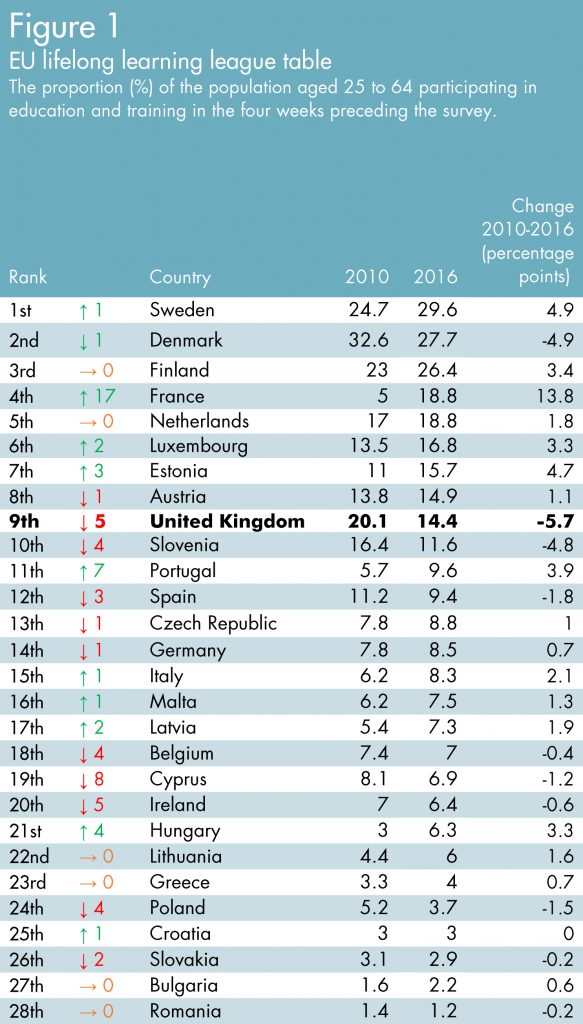UK slides down the adult learning league table
Big cuts to adult skills budgets since 2010 mean UK workers are falling behind their European counterparts when it comes to building new skills for the changing world of work
UK slides down the adult learning league table – new research shows
Big cuts to adult skills budgets since 2010 mean UK workers are falling behind their European counterparts when it comes to building new skills for the changing world of work.
A new report from the Changing Work Centre (a joint initiative between the Fabian Society and Community union) and the German think tank the FES shows:
- The UK plunged to ninth place in the EU lifelong learning league table in 2016, five places lower than 2010.
- The proportion of adults aged 25-64 participating in adult skills training fell from 20% to 14% between 2010 and 2016.
- The adult skills budget in England was cut by more than 30% between 2010 and 2015.
The report argues that the end of free movement of labour following Brexit could expose this underinvestment as employers will be less able to use foreign labour to fill skills gaps. Other countries are already making major investments in adult skills and without UK investment, the gap could widen.
New Tricks sets out five ways the UK can establish a genuine lifelong learning culture and rise up the league table. These lessons are inspired by innovative approaches to lifelong learning in Singapore, Germany, Australia, Austria and France. The report argues the UK government should:
- Extend its national retraining scheme to include every sector.
- Look again at individual learning accounts after abandoning them sixteen years ago.
- Establish a new employment insurance to cover living costs during training.
- Introduce a right to request training leave after a year of employment and a mandatory career interview every two years.
- Invite the Labour party to take part in cross-party talks on establishing a lifelong learning strategy for the next two decades
The research report says the government must act now to prepare the whole workforce for industrial change and ensure the UK remains globally competitive.
Cameron Tait, head of the Changing Work Centre and senior research fellow at the Fabian Society said:
”Technological development, globalisation, changing demographics and shifting global demand mean the nature of work is changing faster than ever, and the skills the workforce needs are changing too.
“A genuine lifelong learning culture is required to keep people active in the labour market and to ensure the UK workforce of today and tomorrow is able to thrive in the new economy.”
Yvette Cooper MP, chair of the Changing Work Centre, is available for comment.
– Ends –
Notes
- Contact: Claire Sewell, head of media and communications at the Fabian Society | 0207 227 4906 | claire.sewell@fabians.org.uk
- Download the New Tricks: Innovative Approaches to Lifelong Learning report PDF
- Download the executive summary
- New Tricks: Innovative Approaches to Lifelong Learning, is by Cameron Tait, head of the Changing Work Centre and senior research fellow at the Fabian Society. This report represents not the collective views of the organisations involved but only the views of the individual authors.
- The report is published by the Changing Work Centre – a joint initiative from the Fabians and Community. The Changing Work Centre is a research centre exploring the changing world of work, run by the Fabian Society and the trade union, Community. The centre is chaired by Yvette Cooper MP.
- The Fabian Society is Britain’s oldest political think tank. Founded in 1884, the society is at the forefront of developing political ideas and public policy on the left. The society is alone among think tanks in being a democratically-constituted membership organisation, with over 7,000 members. It is constitutionally affiliated to the Labour party.
- This report is published in partnership with the Friedrich-Ebert-Stiftung (FES). The FES is a non-profit German political foundation committed to the advancement of public policy issues in the spirit of the basic values of social democracy through research, education, and international cooperation. The FES, headquartered in Berlin and Bonn, has 13 regional offices throughout Germany and maintains an international network of offices in more than 120 countries.

Source: data from Eurostat ‘Participation rate in education and training (last 4 weeks) [trng_lfse_01]’ 2010 to 2016
